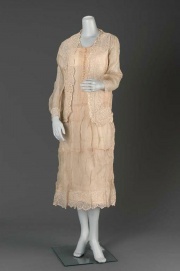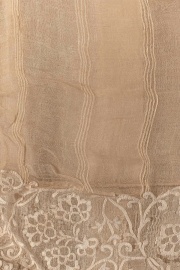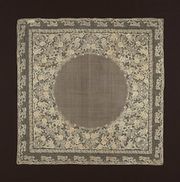Difference between revisions of "Piña"
Jump to navigation
Jump to search
| (4 intermediate revisions by the same user not shown) | |||
| Line 1: | Line 1: | ||
| − | [[File:2002.416.1-2-SC65935.jpg|thumb|]] | + | [[File:2002.416.1-2-SC65935.jpg|thumb|Appliqued piña fiber dress; MFA# 2002.416.1-2]] |
== Description == | == Description == | ||
| − | + | [[File:2002.416.1-2-SC65937.jpg|thumb|Dress close-up<br>MFA# 2002.416.1-2]] | |
Long bast fibers obtained from the leaves of pineapple plants, ''Ananas magdalenae'' or ''Ananas comosus'', native to tropical America. Pineapple plants are cultivated in Hawaii, Philippines, Indonesia, India and West Indies. The light cream color piña fibers are fine, soft and lustrous. Piña fibers are very resistant to salt water and are strong, wear resistant and easy to clean. They are used for fabrics, ropes, twines and paper. Piña cloth, a soft, sheer fabric made from the long fibers, is used for apparel, accessories and home furnishings. | Long bast fibers obtained from the leaves of pineapple plants, ''Ananas magdalenae'' or ''Ananas comosus'', native to tropical America. Pineapple plants are cultivated in Hawaii, Philippines, Indonesia, India and West Indies. The light cream color piña fibers are fine, soft and lustrous. Piña fibers are very resistant to salt water and are strong, wear resistant and easy to clean. They are used for fabrics, ropes, twines and paper. Piña cloth, a soft, sheer fabric made from the long fibers, is used for apparel, accessories and home furnishings. | ||
| Line 8: | Line 8: | ||
''Ananas magdalenae; Ananas comosus''; pina; pita; pineapple fiber; abacaxi (Brazil); silk grass; fibras de piña (Esp.) | ''Ananas magdalenae; Ananas comosus''; pina; pita; pineapple fiber; abacaxi (Brazil); silk grass; fibras de piña (Esp.) | ||
| − | [[File: | + | [[File:52.596-SC10230.jpg|thumb|Piña handkerchief<br>MFA# 52.596]] |
| − | == | + | == Risks == |
| − | + | Not resistant to acids. | |
| − | + | == Physical and Chemical Properties == | |
| − | |||
| − | |||
| − | == | ||
| − | + | Fiber length 10 - 20 cm (2 - 4 inches) Cross section = oval | |
== Comparisons == | == Comparisons == | ||
| − | [[ | + | [[media:Properties of Natural Fibers.pdf|Properties of Natural Fibers]] |
| − | |||
| − | |||
| − | |||
| − | |||
| − | |||
| − | |||
| − | |||
| − | == | + | == Resources and Citations == |
* G.S.Brady, ''Materials Handbook'', McGraw-Hill Book Co., New York, 1971 Comment: p. 728 | * G.S.Brady, ''Materials Handbook'', McGraw-Hill Book Co., New York, 1971 Comment: p. 728 | ||
Latest revision as of 13:27, 30 October 2020
Description
Long bast fibers obtained from the leaves of pineapple plants, Ananas magdalenae or Ananas comosus, native to tropical America. Pineapple plants are cultivated in Hawaii, Philippines, Indonesia, India and West Indies. The light cream color piña fibers are fine, soft and lustrous. Piña fibers are very resistant to salt water and are strong, wear resistant and easy to clean. They are used for fabrics, ropes, twines and paper. Piña cloth, a soft, sheer fabric made from the long fibers, is used for apparel, accessories and home furnishings.
Synonyms and Related Terms
Ananas magdalenae; Ananas comosus; pina; pita; pineapple fiber; abacaxi (Brazil); silk grass; fibras de piña (Esp.)
Risks
Not resistant to acids.
Physical and Chemical Properties
Fiber length 10 - 20 cm (2 - 4 inches) Cross section = oval
Comparisons
Resources and Citations
- G.S.Brady, Materials Handbook, McGraw-Hill Book Co., New York, 1971 Comment: p. 728
- Rosalie Rosso King, Textile Identification, Conservation, and Preservation, Noyes Publications, Park Ridge, NJ, 1985
- Marjory L. Joseph, Introductory Textile Science, Holt, Rinehart and Winston, Fort Worth, TX, 1986
- J.Gordon Cook, Handbook of Textile Fibres:I Natural Fibres, Merrow Publishing Co. , Durham, England, 1984
- Fairchild's Dictionary of Textiles, Phyllis G.Tortora, Robert S. Merkel (eds.), Fairchild Publications, New York City, 7th edition, 1996
- The American Heritage Dictionary or Encarta, via Microsoft Bookshelf 98, Microsoft Corp., 1998
- Edward Reich, Carlton J. Siegler, Consumer Goods: How to Know and Use Them, American Book Company, New York City, 1937


